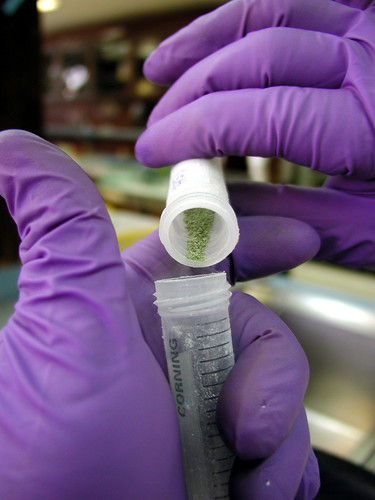
Image : http://www.flickr.com
Are you particularly vulnerable to manipulation? Or, are you stressed by feeling constantly like you are dancing to someone's strings. Maybe at work, at home, or amongst your 'friends'. Chronically manipulated people tend to have a range of related personality styles that are both identified and used by manipulators. These are like buttons of control for the manipulator. The first step to reducing manipulation in your life is to recognize the buttons in you.
What are the main psychological buttons?
1 Having a very strong need for approval and acceptance
Nearly everyone wants to be liked and accepted. That is healthy and normal. But, many people, perhaps because of their genetic background and/or life circumstances, have a much higher need for approval than others. The higher your need, the more prone you are to manipulation.
A manipulator may keep those with a strong need for approval in a constant state of anxiety by never paying you compliments or finding anything good in what you do. Think of yourself as working hard all day to get a perfunctory pat on the head, or to get a disparaging remark about one minor fault after a whole heap of great work.
2 Fearing negative emotions
Some people are very sensitive to strong negative emotions, conflict, or confrontation. This means they modify their behaviour to avoid the anger or conflict. Nearly always at a cost to themselves or someone they are representing.
Some manipulators purposefully put on an angry look, or start to raise their voice, simply to cause confusion or stress in their victim. Think of the whipped dog, that cringes when a hand is slightly raised. It makes itself small and low, adjusting its behaviour in an attempt to reduce the perceived threat.
3 Being a people pleaser and hung up on being nice
There is nothing wrong with being nice. But, there is a problem when you constantly ignore your own needs for the sake of others. How do you know if you are a people pleaser?
Do you burst into a frenzy of activity to help someone just because they mentioned a need, then curse under your breath about how little time you have to get your own things done? Do you give much more to others than is given to you? Then you may be a people pleaser.
There is usually a strong element of "if I am nice to others- then they wont hurt me" in chronic people pleasers.
What about Mother Theresa? She gave a great deal of herself for others.
Mother Theresa was not a people pleaser (just ask those she negotiated with to get support for her efforts). People like Mother Theresa help others on their own terms and are in control of their share of any relationships.
4 Lacking assertiveness
If you find it difficult to say no, you may suffer from a lack of assertiveness. People who are poorly assertive are also likely to be people pleasers. You are in double trouble when you also have strong aversion to negative feelings as well.
Often, a lack of assertiveness is linked with sensitivity, and a fear of negative responses to your needs or wants. Saying no may make you feel anxious, nervous or uncomfortable. Also, you may feel exasperated and angry with yourself for being taken advantage of each time.
Many people have these feelings to some degree, but they say no anyway, when it is appropriate for them.
5 Having low self-reliance
People with low self reliance are very uncertain about their own judgment and abilities. Often, they have very little self direction in their lives. In previous generations, many married and highly capable women had reduced self reliance as they had not been raised to expect to be a master of their own destiny, especially outside of the home.
People with low self-reliance can usually be spotted by the way they constantly seek input into most of their pending decisions, often even simple ones.
Low self reliance makes you an easy mark for a manipulator as they will be there to control and direct you.
You can expect a manipulator to denigrate your areas of expertise and any decisions you make. Manipulators will often quickly steer you to areas of their own competence where they can demonstrate their vastly superior 'mastery' and add to your feelings of inadequacy.
6 Feeling like you have little control over your destiny
This is related to low-self reliance but differs in that the person feels the external world has much more control over how their life turns out than they do. In contrast, people with a more internal focus have a greater belief that they have a large degree of control over what happens to them.
Having an external control view of the world makes you both vulnerable to manipulation and depression.
A major factor in depression is feeling that you have little or no control over an ongoing unpleasant or dangerous situation. Being with a manipulator and believing that you have little control over life is a recipe for depression. Their manipulations and your beliefs will lead you onto a path of learned helplessness.
7 Having an under-developed sense of identity
Do you feel like you are somewhat insubstantial and that your character is small and insignificant compared with those around you? Are you uncertain about who you really are and what you stand for. Do you live your life more through others (including those on television) than yourself?
Many people have had a childhood in which their worth was continually denigrated. Or, in their sensitive teens, received continual negative feedback and comments. Such a background can stunt a person's development and weaken their sense of identity.
To a manipulator, such people are a wonderful amorphous lump of clay, upon which they can craft their own designs. Usually, to make you more compliant to their will and to get you to live your life more through them.
Summary
No doubt many of you reading this article will recognize that you have several of these buttons, These buttons tend to be interlinked around a lack of self confidence and related states. Most people have these traits to varying degree and this makes them vulnerable to manipulation. Being aware of these traits is the start to increased resistance to manipulation. The real problem for people occurs when these buttons are dominant parts of their personality. It is especially important for the victims of manipulators to realize that they can and should change.
It is much easier to change yourself than a manipulator.
Dr Ian King (ADBLT MSc DPhil PGC Bus Man) - gives up to date information specifically researched for mature adults on how they can seize back their lives at http://masteringmaturity.com
Subscribe now to my FREE weekly newsletter and you will get two free reports giving you the simple secrets to easily regain your health, energy and memory.
What do I do for you? - Screen huge amounts of the latest research, books and internet articles and combine the information with my knowledge to give you simple secrets that make a real difference.
Brief credibility statement:
- 30 years experience in investment, management, and research in biotechnology, food science, agricultural science, and diagnostics. Oxford educated, Director of innovation company. Nationally accredited coach with certificate in sports medicine. Managed a Rehabilitation House for institutionalized mental health patients.






